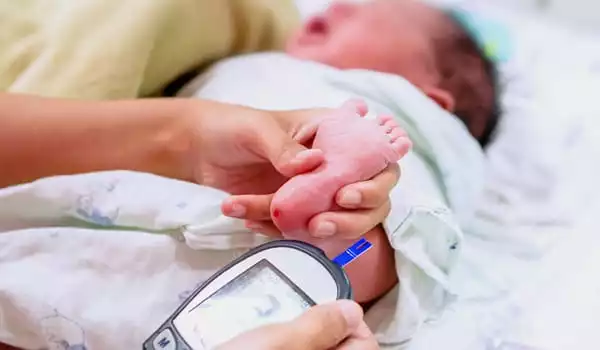During pregnancy, the placenta transports glucose or sugar from the mother to the fetus. Following birth, the newborn obtains glucose from the liver as well as breast milk or formula feedings. Babies require glucose or sugar for energy, and their brains consume the majority of the glucose in their bodies. As its primary source of energy, the brain is dependent on blood glucose. Seizures, major brain injury, irreparable brain damage, developmental delays, heart failure, seizures, epilepsy, or cerebral palsy can arise from severe or prolonged hypoglycemia or low blood sugar in a newborn who is not treated.
Low blood sugar in infancy is dangerous, but treatment can prevent long-term brain damage in infants, according to a recent study. The study, conducted by the University of Waterloo and the University of Auckland, is the first of its kind to conclude that regulating blood sugar levels in neonates with hypoglycemia reduces brain damage.
Low blood sugar, often known as hypoglycemia, happens when the glucose level in the blood is abnormally low. Low blood sugar is extremely prevalent, impacting one out of every six babies. Because glucose is the primary fuel supply for the brain and body, untreated low blood sugar can have a negative impact on a child’s neurodevelopment up to the age of 4.5 years.
Rich pre-school and school experiences may help a child’s brain to re-organize and improve their academic abilities up to the developmental milestones of their peers.
Ben Thompson
While it is well understood that hypoglycemia influences the pattern of the early developmental course, there is a considerable vacuum in our understanding of how hypoglycemia affects a child’s development after early childhood. The team’s current study looked at the long-term effects of a child’s brain development in mid-childhood—nine to ten years old—and discovered that there was no significant difference in academic outcomes between children who were exposed to hypoglycemia as newborns and their classmates.
“Rich pre-school and school experiences may help a child’s brain to re-organize and improve their academic abilities up to the developmental milestones of their peers,” said Ben Thompson, a professor from the School of Optometry & Vision Science at Waterloo, CEO of the Centre for Eye and Vision Research in Hong Kong, and member of the team working on the groundbreaking research.
Researchers followed 480 children born at risk of neonatal hypoglycemia and tested each kid between the ages of nine and ten in five critical areas: scholastic success, executive function, visual-motor function, psychosocial adaptability, and overall health. All of the children had previously participated in studies, which provided researchers with information on their neurodevelopment outcomes at two and 4.5 years old.

According to the research team, this improvement in neuro-cognitive performance could be due to brain plasticity, or the brain’s ability to adapt, change, and mature as a result of experience. “It’s reassuring to know that babies born with and treated for a common disease like hypoglycemia are unlikely to suffer long-term brain damage,” Thompson added.
Over the past decade, the research team has continued studying the efficacy of dextrose gel to treat low blood sugar in the first 48-hours of a newborn’s life, avoiding the need for babies to go to newborn intensive care units immediately after delivery. Dextrose is a sugar that comes from corn or wheat that is chemically identical to blood sugar.
Infants with hypoglycemia (low blood sugar) may require glucose water or formula, as well as intravenous (IV) glucose or Dextrose. If the sugar level is very low, the baby may require a high concentration of a glucose solution to be promptly injected into their IV line. If the baby’s low blood sugar persists, he or she may be given drugs to raise blood glucose levels or reduce insulin production. If these measures do not correct the newborn’s low blood sugar, they may need to have a part of their pancreas removed to reduce the quantity of insulin produced in their body.
In a separate study published in the Journal of the American Medical Association, the researchers looked at the long-term effects of dextrose gel as a treatment for hypoglycemia in children and discovered that it made no difference in the risk of neuro-sensory impairment at age two. This treatment is still widely utilized in a rising number of nations outside of New Zealand, including Canada, Australia, the United Kingdom, and the United States.
The findings, Association of newborn hypoglycemia with mid-childhood academic performance and Prophylactic oral dextrose gel and neurosensory impairment at 2-year follow-up of participants in the hPOD randomized trial, were published this month in the Journal of the American Medical Association.















